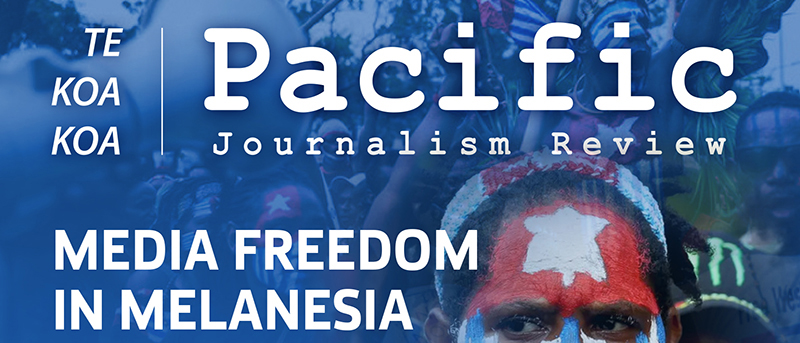Special PJR Melanesian edition offers voice to the voiceless (v26n1)

Hostile media environments in Fiji, Papua New Guinea and West Papua pose growing challenges to the Melanesian region’s democracies, says Pacific Journalism Review in its latest edition.
The New Zealand-based research journal warns that laws and cultural restrictions are providing barriers to open information and are silencing journalists.
NEWS FLASH: IFJ report on PJR | PMC protests over Facebook censorship | RSF protest to Facebook | RNZ Pacific on Facebook censorship
Partnering with the Melanesia Media Freedom Forum (MMFF) and Griffith University, the journal has published 32 articles in the July edition, mostly devoted to threats to the region’s media but also addressing other critical issues such as the covid-19 pandemic, climate change and tropical cyclones.
“The legacy of the former Fijian military dictatorship continues to maintain a stranglehold on the local press under Prime Minister Voreqe Bainimarama, fostering a culture of self-censorship,” the journal says in an editorial.
The publication, founded in Papua New Guinea and now in its 26th year, refers to Fiji’s “repressive” Media Industry Development Decree that became a parliamentary Act in 2015, paving the way for “even more insidious control” through a state-controlled Media Industry Development Authority (MIDA).
AUDIO ON PMC SOUNDCLOUD:
Pacific Media Centre · RNZ Pacific Dateline: Media under strain in Melanesia during challenging eraVanuatu’s arbitrary government attempt to deny former Vanuatu Daily Post media director Dan McGarry permission to re-enter the country in November 2019 after he participated in the inaugural MMFF conference in Brisbane “heralds a troubling time for press freedom”.
The election of Prime Minister James Marape in Papua New Guinea in mid-2019 removed “the dictatorial grip” of former Prime Minister Peter O’Neill that led to “countless violations of press freedom – but media freedom … remains endangered”.
The PJR also highlighted how both daily newspapers were owned by overseas multinationals – the PNG Post-Courier by Australian-US media tycoon Rupert Murdoch’s News Corp, and The National, by the Malaysian logging company Rimbunan Hijau.
Press freedom in “Indonesian-occupied West Papua continues to deteriorate” and a handful of courageous journalists were “walking a thin line between compliance and press freedom”.
This edition of Pacific Journalism Review – edited by Kasun Ubayasiri, Faith Valencia-Forrester, David Robie, Philip Cass, and Nicole Gooch - has also acknowledged positive developments in media freedom, “however fleeting”.
Journal managing editor Professor David Robie described this as the “most significant” volume of Pacific journalism research ever produced and it was a "voice for the voiceless".
In the unthemed section, there are articles on investigative journalism as research, creative practice as research in the Frontline department, and Nobel Peace Prize co-winner Professor Elisabeth Holland writes about Tropical Cyclone Harold’s swathe of destruction through four Pacific countries and the impact of covid-19.
Articles on journalism education/training in Timor-Leste and the history of New Zealand’s unique name suppression laws are also featured.
The reviews section is led by a compelling analysis of the 1972 sacking of Listener editor Alexander MacLeod, along with an interview with ‘Akilisi Pohiva biographer Michael Field, and reviews of the recently published controversial book The Road: Uprising in West Papua and The Refugee’s Messenger, a collection edited by TRT World Research Centre director Dr Tarek Cherkaoui.
At 324 pages, this is the largest PJR volume published. The journal was recently added to the global Directory of Open Access Journals (DOAJ), to supplement the SCOPUS and Web of Science indexes where it is already listed.
Note: Due to the current level 3 COVID-19 lockdown in Auckland, there will be a delay in the mail out of the hardcopy edition of Pacific Journalism Review and uploading of the databases such as INFORMIT.
PJR spotlights media strain in Melanesia











